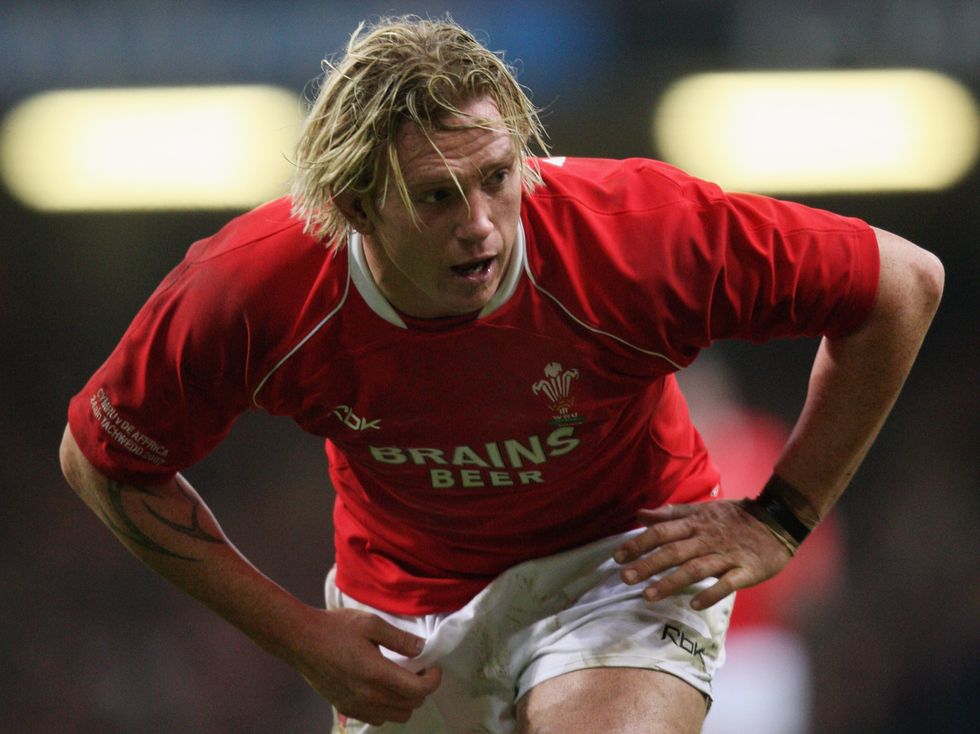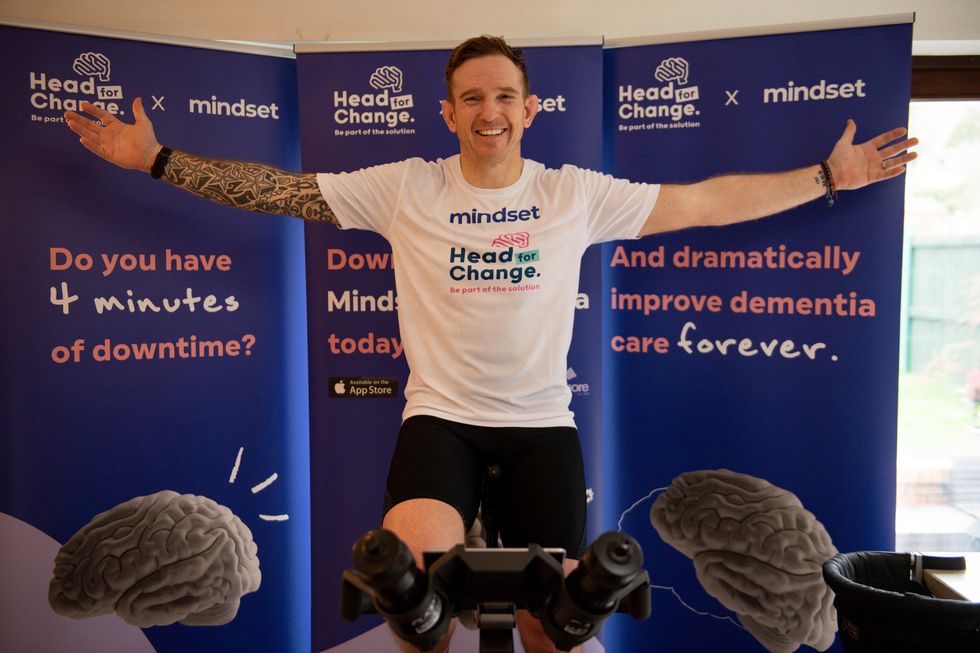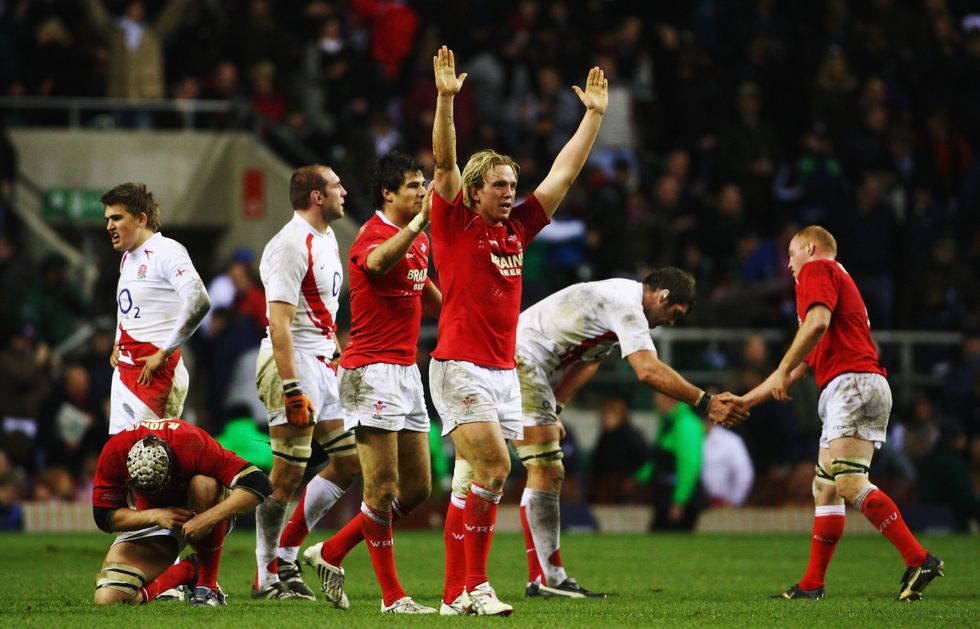A former Wales star has laid down the gauntlet to rugby bosses ahead of today’s head injury case management hearing.
Alix Popham, 45, was diagnosed with dementia in 2020, just nine-years after hanging up his boots following stints at Newport, Leeds Tykes, the Llanelli Scarlets and Brive.
The 33-time Wales international is joining around 560 former rugby players as law firm Rylands Garth prepares to provide evidence in a two-day case management hearing after stars were left battling with life-altering neurological injuries.
England’s 2003 World Cup winning hooker Steve Thompson and ex-Wales skipper Colin Charvis were also named among the players hoping for compensation.

Alix Popham received 33 caps for Wales
GETTY
The players behind the lawsuit, which is being brought against World Rugby, the Rugby Football Union and Welsh Rugby Union, hope their evidence will be heard in court.
Popham, who revealed he wants to one day have the opportunity to “eyeball” those still involved in rugby, told GB News: “It’s five years in April since I got diagnosed. It’s bloody crazy how quick that seems but it’s gone really slow with the progression that we’re making on the legal side.
“The conversations we’re having in rugby now were happening in boxing 100 years ago. It’s shocking what I’ve learned about what’s going on, what hasn’t come to light, what hasn’t been told to parents, what still isn’t being told to parents, that every hit is causing some damage, and it’s just wrong.
“There’s so many things going on in the UK at the moment – the Post Office Scandal, the Blood Scandal – and this scandal. But with what we know, with the other side and their lawyers, they’re just playing a game of chess at the moment, and it’s at the cost of current players’ health.”
He added: “The other side is dragging it out for as long as possible, hoping we run out of money. But we’ve got over £20million in funding from the insurers so that’s never going to happen.
“We’re not going anywhere and it’s happened in lots of other legal cases like this. They’ve got to gather all the evidence that we’ve got before taking the decision if they’re going to take us to trial. I’ve seen the evidence that we’ve got and it’s shocking with what has gone on over the decade and what has been known.”
Revealing what justice would look like, Popham said: “We won’t settle on anything unless those changes are made. I doubt they will admit guilt, like the NFL didn’t, but there’s got to be some financial compensation because personally it has been a very difficult time for me.”
Popham later revealed that many players have seen their lives changed “horrendously” after suffering severe neurological injuries.
The father-of-three explained that he is working two-day-a-week spread across five-days.
“A lot of players are really struggling mentally and what’s going on is torture,” the 45-year-old added.
LATEST DEVELOPMENTS:

Former Wales international Alix Popham training at his home in Newport, South Wales
PA
Popham also voiced his frustration with the Six Nations implementing the 20 minute red card law, warning the decision will mean players continue to make dangerous tackles without a meaningful deterrent.
He went on to explain how other changes should be made to rugby to prioritise player safety, including ending tactical substitutions and limiting contact training sessions during the season.
“It’s an old school mentality that coaches and players believe if they don’t do contact during the week then they won’t be ready for the following Saturday,” Popham said.
The Welsh Rugby Union announced in December that it will now provide a brain health scheme for ex-players.
The initiative, called the Brain Health Service, was rolled out three years after the Rugby Football Union opened its Advanced Brain Health Clinic for ex-England stars.
Popham, who watches rugby “through different eyes” following his dementia diagnosis in 2020, also warned that traumatic brain injuries have resulted in a reduction in amateur playing numbers.
He claimed: “The amateur players are realising that if they get a bad injury, be it a shoulder, or a knee, or head injury, then it could put them off work and with everything that’s going on in the country, with money and things like that, people can’t take the risk.
“I also think mums and dads are reading my story, Steve Thompson’s story, seeing the documentaries and realising I wouldn’t want Johnny playing rugby. When I got diagnosed, I was glad my girls hadn’t come to me and said that they want to play rugby. And now I would not allow them to play.”
A staggering 174 rugby clubs that existed in England in 2002 have now disbanded, with just 36 new clubs being created during the same time period.
An RFU commissioned review, entitled Changing the Game: The Future of Schools Rugby in England, also highlighted fears over head injuries among school pupils.

Alix Popham (C) of Wales celebrates as the final whistle blows during the RBS Six Nations Championship match between England and Wales at Twickenham on February 2, 2008
GETTY
The review warned: “In the ‘marketplace’ of school sport, rugby is not winning. A wide range of sports less traditionally played at school are gaining ground, while rugby is losing out. And while football and cricket are now played widely by girls in schools, this is not the case for rugby, despite sharp growth of rugby for women and girls outside schools and the excellence of the England women’s team.
“Greater evidence and awareness of injury risk, including head injury risk, and changing attitudes, including greater risk aversion in society, have led to increased challenge to the central place of rugby even in highly traditional rugby-playing schools. Schools which do not currently play rugby perceive these and other factors to be barriers to starting to play.”
Measures have been brought in by the Rugby Football Union to ensure that grassroots rugby players who suffer a traumatic brain injury must now wait a minimum of 21 days before returning to the pitch.
Despite the review in England also citing Wales’s historic connection with the sport, football overtook rugby as the most played sport on the other side of the River Severn in 2022.
A study presented to the Football Association of Wales showed up to 40 per cent of children in Wales play football, with just six per cent of respondents from all age groups participating in rugby.
However, today’s case management hearing comes after several issues were raised on both sides of the legal dispute.
Paul McCrory, who was chair of the Concussion in Sport Group, was forced to step down in March 2022 following allegations of plagiarism.
The total number of retractions made now exceeds 17, with ex-players fearing the potential impact of the plagiarism scandal on the debate around head injuries.
However, the lawsuit on behalf of the impacted rugby players was stuck in legal limbo in October last year after former Wasps prop Will Green claimed that Richard Boardman of Rylands Garth encouraged him to sign up to the litigation even after a second scan found no signs of brain damage.
The Telegraph reported that the firm’s attempt to force the 50-year-old to pay up was dismissed in court, with the judge ruling Rylands Garth misrepresented its services and a letter of engagement was “at very best, vague, muddled and highly confusing”.
A joint statement from World Rugby, the Welsh Rugby Union and Rugby Football Union ahead of today’s case management hearing said: “Over the next two days, we aim to make meaningful progress in this legal action, four years after it was first initiated. As rugby’s governing bodies, we remain committed to ensuring that the players’ concerns are heard in court as soon as possible. We hope that the claimants’ lawyers engage in the hearing in the same spirit.
“Player welfare remains rugby’s top priority. Across all levels of the game, welfare-focused changes to the laws are enhancing player safety. Current elite players have access to cutting-edge technology and world-class medical care, whilst former elite players in England, Scotland, Wales, Ireland, and Australia are benefiting from Brain Health Services we have established and that are set for expansion to more unions later this year.”